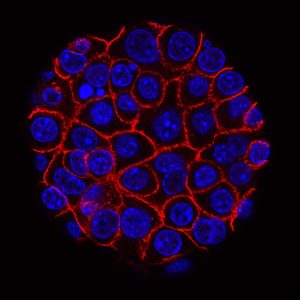
Scientists make possible pancreatic cancer discovery
pharmafile | November 18, 2015 | News story | Research and Development | Pancreatic cancer
Cancer researchers say they have discovered a potential new method of treatment for pancreatic cancer that could improve survival rates.
Preliminary research conducted in mice revealed the possibility of a new, minimally invasive treatment, activated by ultrasound waves, to treat one of the most common and deadly forms of cancer.
Initial tests on mice with the most common type of pancreatic tumour, called pancreatic ductal adenocarcinoma (PDAC), showed a five-fold reduction in tumour size.
University Professors John Callan and Tony McHale, from Ulster University’s biomedical sciences research institute in Coleraine, teamed up with the University of Oxford’s Professor Eleanor Stride and one of Northern Ireland’s top pancreatic cancer surgeons, Mark Taylor, to collaborate on the research.
The team developed tiny oxygen filled microbubbles with a non-active drug attached to the surface. After delivery by injection, the bubbles are intentionally burst in the tumour using soundwaves, which releases oxygen and non-active drug. The sound waves also activate the drug, a treatment known as sonodynamic therapy (SDT), which then attacks and kills the tumour cells.
Ulster University’s Norbrook chair of pharmaceutical science, Professor John Callan, says: “Because we can control exactly where the sound waves go, we can selectively target the tumour and spare healthy tissue making this a highly targeted therapy with reduced side-effects. This really is a groundbreaking development and one of the most promising advances in pancreatic cancer research for decades.”
In addition to the targeted delivery and treatment potential offered by the approach, the delivery of oxygen directly to cancer cells also has the potential to increase the effectiveness of existing treatments for a range of cancer types, the researchers explain.
Professor Callan adds: “Conventional cancer treatments such as radiotherapy and certain chemotherapies are often limited by poor oxygen supply, which is a characteristic of most solid tumours, given their unique blood vessel structure. When our microbubbles burst, they provide a temporary boost in the amount of oxygen available in the tumour, enhancing the effectiveness of techniques that require oxygen to work.”
Pancreatic cancer surgeon Mark Taylor worked closely with Ulster University and Oxford academics on the project, and is excited by the potential offered by this new treatment.
He comments: “Pancreatic cancer patients typically present at an advanced stage because the disease tends to have few symptoms until it is well established. By the time patients seek medical advice the tumour tends to be large and well established in the abdomen, making surgical intervention and other treatments largely unsuccessful.
“This therapy has the potential to reduce pancreatic tumours to a size which would make surgery an option for a greater number of patients, as well as increasing palliative care options at the very advanced stage. It is a very positive step forward in treating one of the most challenging forms of the disease.
“We are currently working with the research team at Ulster University to identify the best possible way to move this technology to the clinic in as timely a manner as is possible.”
Pancreatic has the lowest survival rate of all 21 of the most common cancer forms in the UK. Just four% of patients survive five years or more post-diagnosis: a figure which hasn’t improved in more than 40 years – and more than 200,000 people worldwide die from pancreatic cancer annually.
Leanne Reynolds, who is head of research at Pancreatic Cancer UK, says: “We are excited to hear about this interesting research, which could lead to a breakthrough in treatments for pancreatic cancer, and potentially longer lives for thousands of people across the UK. While it will be some time before this research reaches the clinic, we welcome any research like this, because there are so few treatment options for pancreatic cancer.
“That’s why all research funders must invest more into pancreatic cancer. At the moment, a shocking 1.4% of cancer research funding in the UK goes towards pancreatic cancer, and that has to change.”
Joel Levy
Related Content

FDA grants ODD to Candel Therapeutics’ pancreatic cancer treatment
Candel Therapeutics has announced that the US Food and Drug Administration (FDA) has granted Orphan …

Arcus Biosciences shares results from phase 1b trial for pancreatic cancer treatment
Arcus Biosciences has announced new data from the ARC-8 phase 1b clinical study which is …

Jacobio Pharma receives CDE approval for pancreatic cancer study in China
Jacobio Pharma has announced that its novel KRAS G12C inhibitor glecirasib’s pivotal study for pancreatic …








